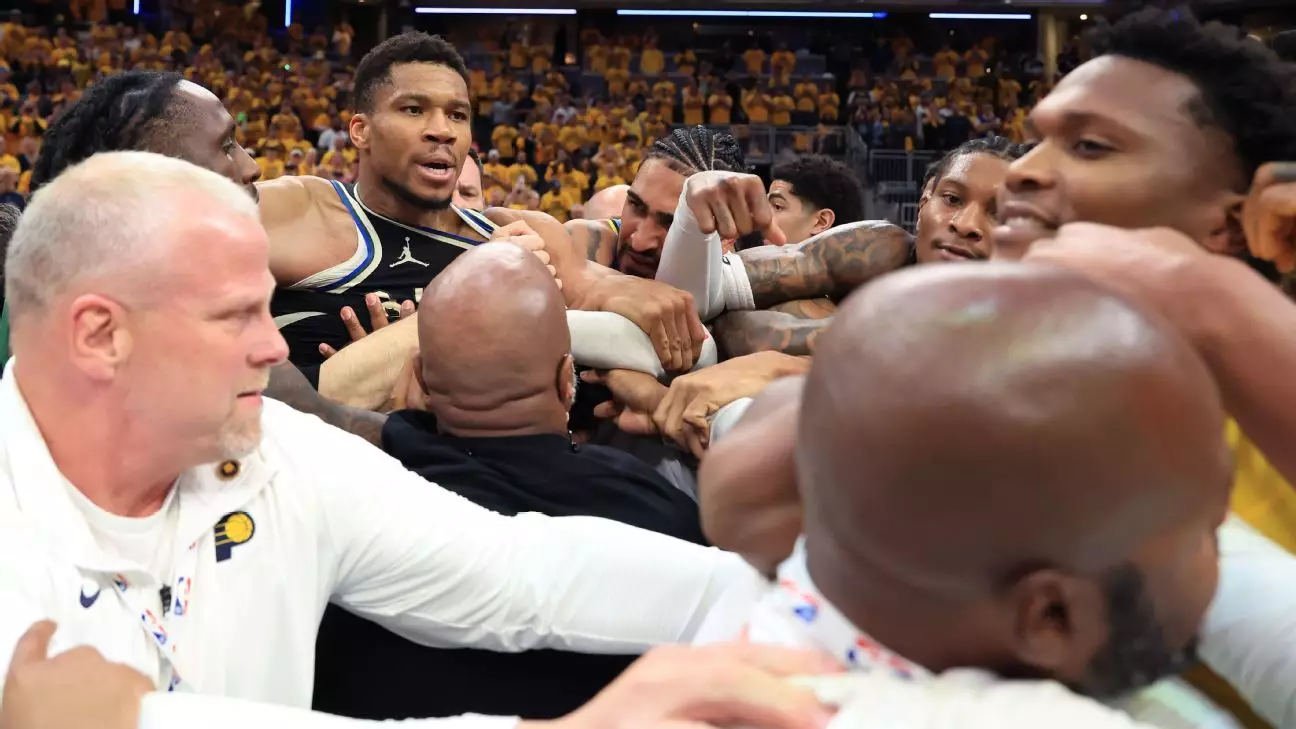In the realm of professional sports, emotions often run high, especially during intense playoff matches. Recently, a confrontation between Giannis Antetokounmpo, forward for the Milwaukee Bucks, and John Haliburton, father of Indiana Pacers guard Tyrese Haliburton, highlighted just how volatile these emotions can become. Following a narrow victory by the Pacers in Game 5 of their first-round playoff series, the atmosphere turned chaotic as John Haliburton celebrated exuberantly, causing a confrontation with Antetokounmpo that drew attention for all the wrong reasons.
Antetokounmpo, known for his competitive spirit and remarkable skill, had just delivered an outstanding performance, posting a triple-double of 30 points, 20 rebounds, and 13 assists. However, despite his impressive stats, the subsequent loss ignited a tempest of feelings not solely among the players but their families as well. The crux of the incident stemmed from John Haliburton’s actions on the court, which Antetokounmpo deemed disrespectful—an overwhelming display of jubilation that traversed the boundaries of respectful sportsmanship.
Examining Sportsmanship and Respect
In discussions about sports, the tenets of sportsmanship play a pivotal role in defining the integrity of the game. Antetokounmpo’s views on respect reflect a deeper issue many athletes grapple with: understanding the line between celebratory enthusiasm and excessive behavior that undermines the competitive spirit. As expressed in his post-game comments, he believes that humility should prevail, even in the face of victory. “I believe in being humble in victory,” he articulated, a sentiment that resonates not only within basketball but across all competitive arenas.
This clash between Antetokounmpo and Haliburton during such a charged moment illustrates how celebrations can be misinterpreted. The perception of disrespect in sports is often subjective and varies from player to player. While some view it as a natural part of competition, others believe that it can overshadow the sportsmanship that should define the game itself.
The Aftermath and Reflections
The immediate fallout from the confrontation saw John Haliburton rushing onto the court, towel in hand, an act that would soon stir controversy and invite both criticism and reflection. Following the games, Giannis and Tyrese Haliburton were compelled to address the incident publicly. Tyrese Haliburton’s assertions that his father was overzealous in his celebration were telling; it indicated an understanding that while enthusiasm is acceptable, it should never come at the expense of mutual respect. His acknowledgment of the situation showcases the delicate balance players must maintain between familial pride and professional decorum.
It isn’t just the actions of the players that reflect on this incident but also the role of families and fans in shaping the sporting experience. While parental support is crucial, there lies a distinct need for them to grasp the dynamics of the game from a player’s perspective. John Haliburton’s eventual public apology suggests awareness of this line and a desire to rectify his missteps. “This was not a good reflection on our sport,” he expressed, showcasing the broader implications of personal actions in the world of professional athletics.
A Culture of Accountability
Such incidents beckon a broader reflection on accountability in sports. Athletes are often held to high moral and ethical standards, yet the poignant reality is that supporters and family members can sometimes stray into an emotional territory that reflects poorly on the sport. The emotions exhibited during games, whether by the players or their families, can lead to heated exchanges that obscure the beauty of the competition itself.
Both Antetokounmpo and Haliburton demonstrate that communication is a vital tool when navigating the aftermath of such confrontations. The willingness to engage in dialogue can de-escalate tensions and promote mutual understanding, ultimately aiding in the evolution of sports culture toward one that values respect and sportsmanship above all.

